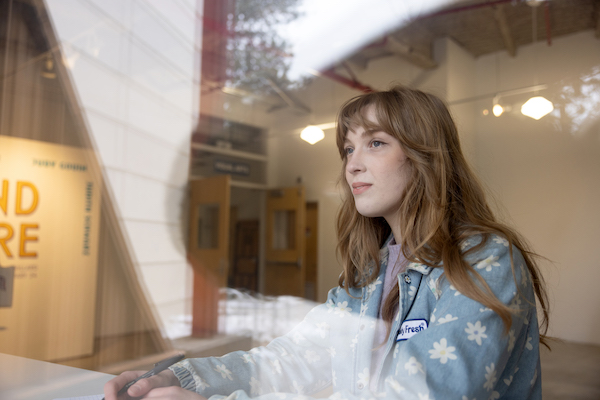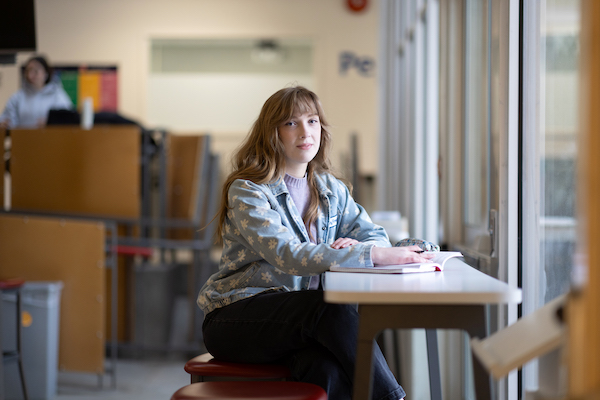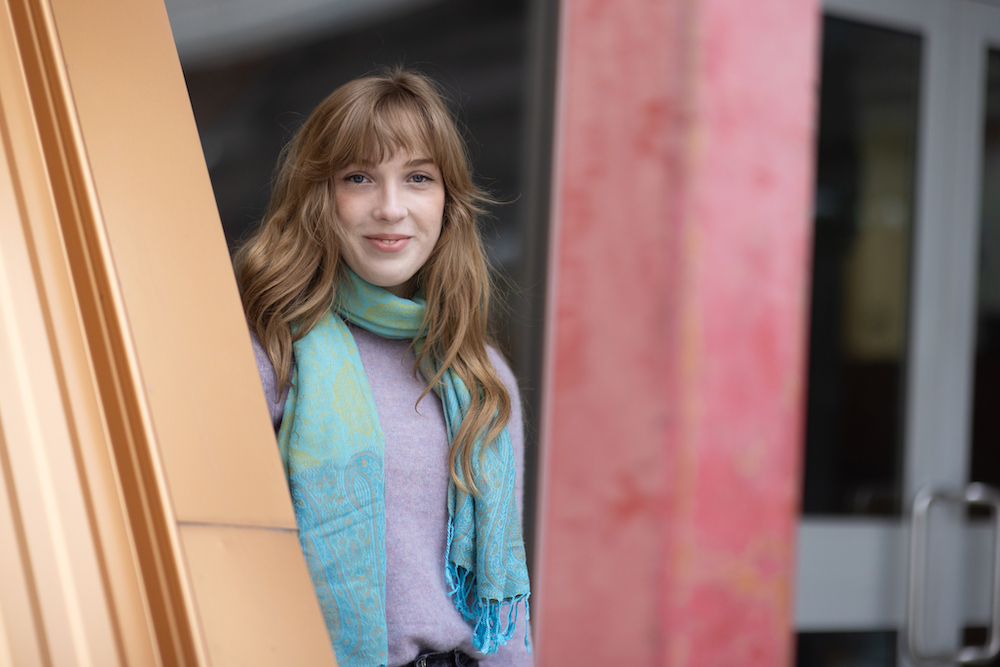Sophie came to the Cultural Studies program at UBC Okanagan excited to learn about cultural theory within the context of her own cultural background. Having been raised in Kelowna, she now spends her time learning about social change issues and movements within the community she grew up in.
Read below to find out Sophie’s favourite spot on campus, her research and interest in reproductive justice, and what she sees as the incredible optimism and interdisciplinary nature of Cultural Studies. As she says, “every class makes you feel like you can change the world.”

1. What made you decide to enrol in Cultural Studies at UBC Okanagan? What was your decision process like?
I started my post-secondary journey at Okanagan College, with a diploma in Communications, Culture and Journalism. Through this diploma, I became fascinated in the ways that cultural theory can explain how meaning is constructed within media representations, and the ways in which such constructions can reflect various ideologies and impart tangible impacts upon groups of people. After graduating, I decided to pursue a more in-depth study of cultural and critical theory, and this led me to enrol in the Cultural Studies program at UBC Okanagan.
My heart was set on this program because I was born and raised in Kelowna, and to learn about cultural theory within the context of my own cultural background is a very unique and valuable asset. Cultural Studies does not just explain how culture is formed and for what reasons, it is oriented with a social justice mindset. In many of my classes, I learn about issues and movements within my community that endeavour to create positive social change.
Being able to study this field at an institution so close to where I have lived my whole life is just wonderful. The decision process for me was a breeze.
2. What has been your experience in the program so far?
My experience in the Cultural Studies program has been absolutely wonderful. The professors are all so passionate about teaching and make an effort to connect with students. Every class makes you feel like you can change the world.
3. Do you have any special memories at UBC that stand out? Is there a moment that validated your decision to come to UBC?
My favourite memory so far would be from Dr. Maria Alexopoulos’ class, “Gender, Race and Medicine: The Construction of the Hysteric.” For our final project, we were instructed to create magazines based on the topics we learned throughout the term, including our own research to extend upon what Maria taught. Our final class was a showcase of each student’s magazine, and it was so amazing to see the creativity and brilliance of the students that I am learning alongside.
I knew I made the right decision to come to UBC Okanagan, as I find myself within a community of like-minded individuals who also want to apply this learning to make the world a better place in any way we can. There is so much optimism within this program and its community of learners and instructors.

4. What are your favourite spots on campus? Best study spots, places to eat, best coffee?
My absolute favourite place on campus is Comma! They have the best chocolate chip cookies. Seriously. Try them.
5. What opportunities have you taken advantage of to connect with the campus and other students? Have you joined any groups or been involved in any programs? How have they affected your experience here?
I am an editorial committee member of the Gender and Women’s Studies undergraduate journal, That’s What [We] Said. It is so lovely to produce this journal alongside my fellow committee members, each of whom are incredibly clever and community-minded. We learn alongside each other. This experience in producing the undergraduate journal is so rewarding, as I get to be a part of a project that amplifies feminist, reparative voices and perspectives within my community. It is an invaluable experience that I believe can impart positive change, as providing a platform for alternative, inclusive and equitable perspective can influence our cultural context for the better.
6. How will your studies in Cultural Studies at UBC Okanagan help you achieve your career goals?
My current career goal is to pursue a master’s degree in interdisciplinary studies at UBCO. My research interests pertain to reproductive justice, specifically the radical impacts of positive abortion experiences and their representations. Due to the incredible interdisciplinary nature of Cultural Studies, I have been able to explore this interest of mine all throughout my program. Any time I have a final project or paper I try to use the concepts and theories that professors have taught to explore my interest of reproductive politics, and I feel that this foundational learning has prepared me greatly– enough to inspire me to pursue higher learning and to produce knowledge on a topic that I feel will help so many people.
7. Do you have any tips for someone who’s considering an Arts degree at UBC Okanagan?
One of my favourite theorists, Eve Kosofsky Sedgwick, wrote a chapter called “Paranoid Reading and Reparative Reading; or, You’re So Paranoid, You Probably Think This is About You.” She writes:
“No less acute than a paranoid position, no less realistic, no less attached to a project of survival, and neither less nor more delusional or fantasmatic, the reparative reading position undertakes a different range of affects, ambitions, and risks. What we can best learn from such practices are, perhaps, the many ways selves and communities succeed in extracting sustenance from the objects of a culture—even of a culture whose avowed desire has often been not to sustain them.”
If you have had the joy of reading Sedgwick, I hope you have a similar takeaway as I do. And that is, within the field of Cultural Studies, we do a lot of work in unearthing highly oppressive and marginalizing ideologies and systemically violent impacts; but what Sedwick is saying here, is that people find ways to sustain themselves despite, they craftly construct joy and pleasure– sustenance– within these same oppressive frameworks. And this is not to disregard these harmful aspects of society, but instead, to draw attention to the resilience and power of community.
My tip to anyone undertaking this major, is to keep an eye out for these reparative practices. It is one thing to identify what is wrong with this world, but its another to see how people are managing to live and finding joy within it. Because this is where the changes are happening.
